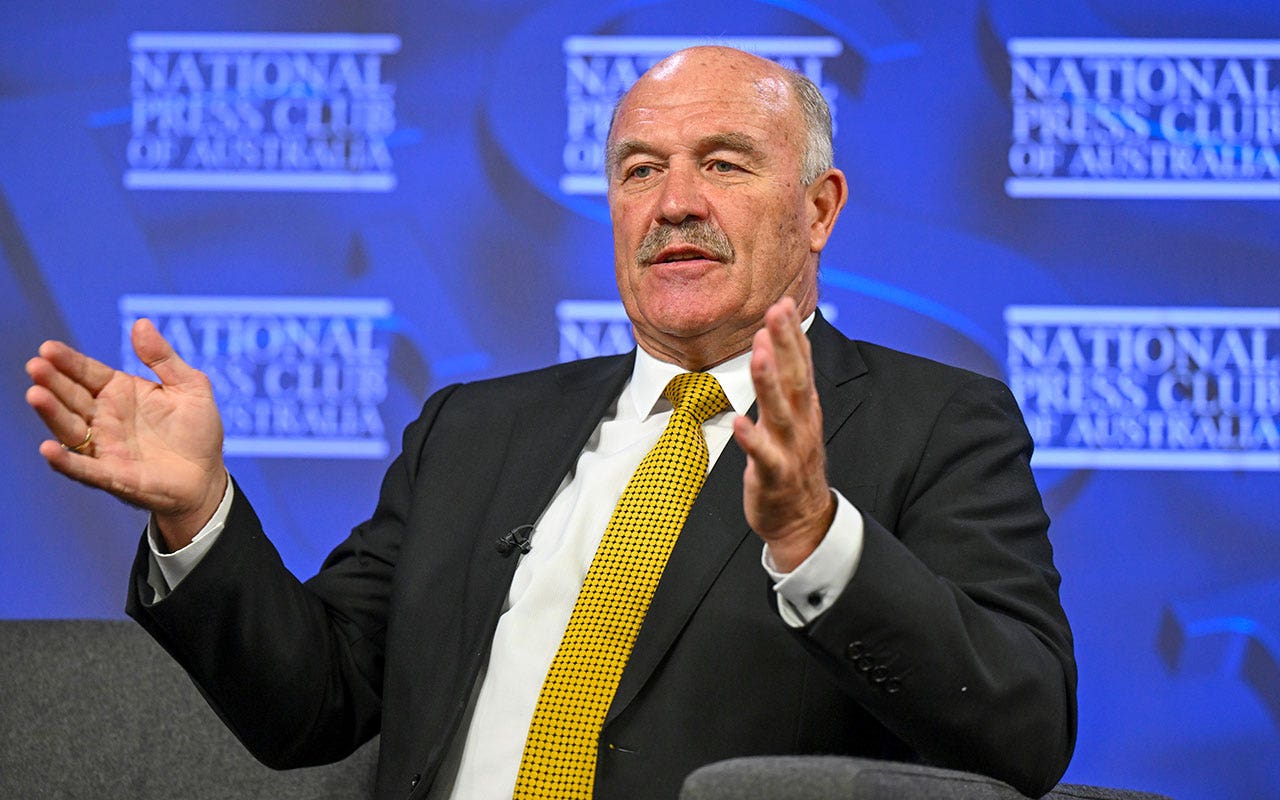Health
Former rugby star Wally Lewis urges Australian government to fund CTE support services

- Wally Lewis has urged the Australian government to fund support services and education about Chronic Traumatic Encephalopathy (CTE).
- Lewis, a rugby player from the 1980s, made an appeal on behalf of the Concussion and CTE Coalition for millions of dollars in funding.
- Lewis revealed that he is living with probable CTE, a type of dementia linked to repeated concussive and sub-concussive blows to the head.
A legendary rugby player has cited the fear and anxiety that has come into his life among the reasons for urging the Australian government to fund support services and education about chronic traumatic encephalopathy (CTE).
Wally Lewis, dubbed “The King” when he played rugby league for Queensland state and Australia in the 1980s, made an appeal on behalf of the Concussion and CTE Coalition for millions of dollars in funding during a National Press Club address Tuesday.
The 64-year-old Lewis said he’s living with probable CTE, which he described as a type of dementia associated with repeated concussive and sub-concussive blows to the head.
HYPE OR HORROR? THE RISK OF CTE BRAIN DISEASE DIVIDES FOOTBALL AND MEDICAL COMMUNITIES
Lewis, who worked for decades as a television sports anchor after retiring as a player in the early 1990s, relayed his own experience to get his message across.
Former Australian rugby league player Wally Lewis, addresses the National Press Club in Canberra, Australia, on April 23, 2024. Lewis, a legendary rugby player of the 1980s has cited the fear and anxiety that has come into his life among the reason for urging the Australian government to fund support services and education about chronic traumatic encephalopathy (CTE). (Lukas Coch/AAP Image via AP)
“The fear is real. I don’t want anyone to have to live with the fear and anxiety that I live with every day, worried about what I’ve forgotten … the fear of what my future will look like,” Lewis said. “And living with the constant fear and anxiety that I’ll let people down – the people who all my life have been able to rely on me and looked to me for my strength and leadership.”
Lewis led Australia’s Kangaroos in 24 international matches, was among the original players to popularize the annual State-of-Origin series, and was included in Australia’s Rugby League Team of the Century in 2008.
The National Rugby League has honored him as a so-called “Immortal” of the game.
O.J. SIMPSON’S BRAIN WILL NOT BE DONATED TO CTE RESEARCH: REPORT
Yet his memories of it aren’t clear. He started playing rugby league as a young boy and also played rugby union at an elite level before embarking on a professional career in rugby league.
“It’s a journey marked by the twin shadows of fear and embarrassment, a journey through the fog of dementia and the erosion of my memory,” he said. “I once had the confidence in myself to succeed, lead a team to victory, captain my country, remember the strengths and weaknesses of opposition teams, organize myself each and every day and feel well and truly in control of my life.
“Now, much of that confidence has been taken away from me by the effects of probable CTE dementia.”
Lewis said better community awareness on concussion was needed and prevention programs, including a sharper focus on tackling techniques from young players through to professionals.
Awareness of CTE and concussion has grown since players in contact football sports, including the National Football League in the United States and rugby union in Britain, launched concussion lawsuits.
The Rugby World Cup took place last year against the backdrop of a concussion lawsuit in Britain that had similarities to one settled by the NFL in 2013 at a likely cost of more than $1 billion.
CTE, a degenerative brain disease known to cause violent moods, depression, dementia and other cognitive difficulties, can only be diagnosed posthumously. It has been linked to repeated hits to the head endured by football, rugby and hockey players, boxers and members of the military.
“As Wally Lewis I have influence – I have a platform – and I intend to use it at every opportunity to bring about change for all Australians like me who are impacted by CTE,” Lewis said, “and to do whatever I can to protect the brains of Australian children from CTE.”

Health
What Happens If You Eat Eggs Every Day? Nutritionists Share the Benefits

Sign Up
Create a free account to access exclusive content, play games, solve puzzles, test your pop-culture knowledge and receive special offers.
Already have an account? Login
Forgot your password?
Get back to the Sign In
Use left and right arrow keys to navigate between menu items.
Use escape to exit the menu.
Health
Ask a doctor: ‘I swallowed a bug — now what should I do?'

Most people have experienced that moment of discomfort when they realize a bug has wound up where it shouldn’t be — in their windpipe.
That includes Taylor Swift, who on more than one occasion has accidentally swallowed a bug while performing on stage in front of thousands of people.
It can be a startling and somewhat disgusting occurrence — but is this dangerous, or just a nuisance?
LOCAL DENGUE FEVER CASES CONFIRMED IN FLORIDA KEYS, SPREAD BY MOSQUITO BITES
Dr. Raj Dasgupta, a quadruple board-certified physician in California, shared with Fox News Digital the true impacts of accidentally swallowing a bug, and the best thing to do if it happens.
“Swallowing a bug can often happen accidentally when you’re eating or drinking outside, or if a bug flies into your mouth,” Dasgupta, who serves as chief medical advisor for Fortune Recommends, told Fox News Digital via email.
Dr. Raj Dasgupta, a quadruple board-certified physician in California, discussed the impact of accidentally swallowing a bug — and the best thing to do if it happens. (Sleepoplis)
“It can also happen if you’re talking or laughing outdoors. Sometimes it might even happen indoors if bugs are in your food or drink and you don’t realize it.”
ASK A DOCTOR: ‘HOW CAN I PREVENT SCARRING FROM BUG BITES AND POISON IVY?’
Swallowing a bug is usually not dangerous, Dasgupta noted.
“The stomach’s digestive acids usually break down the bug, and it is passed out of the body without causing harm,” he said.

“Swallowing a bug can happen accidentally when you’re eating or drinking outside, or if a bug flies into your mouth,” the doctor told Fox News Digital. (iStock)
If the bug carries harmful bacteria or parasites, however, it could cause gastrointestinal issues or allergic reactions, according to the doctor.
The type of bug can make a difference, he said.
“Bugs like beetles or ants are less of a concern, but bugs that are known to spread diseases — such as mosquitoes — might be riskier.”
If you happen to swallow a bug, drinking some water can help wash it down, Dasgupta said.

Taylor Swift has announced the accidental swallowing of bugs, mid-concert, on more than one occasion. (Marcelo Endelli/TAS23/Getty Images for TAS Rights Management)
“If you start feeling sick, like abdominal pain, vomiting or nausea, keep an eye on your symptoms,” the doctor said.
If you have severe stomach pain, ongoing vomiting, trouble breathing, or swelling, rash or itching, Dasgupta said to see a doctor.
CLICK HERE TO SIGN UP FOR OUR HEALTH NEWSLETTER
“If you know the bug could have diseases or if you have health conditions that might complicate things, it’s a good idea to get checked out to be safe,” he added.
For more Health articles, visit www.foxnews/health
Some bugs — including grasshoppers, beetles, termites, mealworms and even stink bugs — are actually considered edible in certain countries, and are prepared and eaten as part of meals, according to WebMD’s website.
Health
“I’m a Dietitian, and Here’s Why an Overly Restrictive Diet Can Backfire”

Sign Up
Create a free account to access exclusive content, play games, solve puzzles, test your pop-culture knowledge and receive special offers.
Already have an account? Login
Forgot your password?
Get back to the Sign In
Use left and right arrow keys to navigate between menu items.
Use escape to exit the menu.
-

 World1 week ago
World1 week agoOne dead after car crashes into restaurant in Paris
-

 Midwest1 week ago
Midwest1 week agoMichigan rep posts video response to Stephen Colbert's joke about his RNC speech: 'Touché'
-

 News1 week ago
News1 week agoVideo: Young Republicans on Why Their Party Isn’t Reaching Gen Z (And What They Can Do About It)
-

 Movie Reviews1 week ago
Movie Reviews1 week agoMovie Review: A new generation drives into the storm in rousing ‘Twisters’
-

 News1 week ago
News1 week agoIn Milwaukee, Black Voters Struggle to Find a Home With Either Party
-

 Politics1 week ago
Politics1 week agoFox News Politics: The Call is Coming from Inside the House
-

 News1 week ago
News1 week agoVideo: J.D. Vance Accepts Vice-Presidential Nomination
-

 World1 week ago
World1 week agoTrump to take RNC stage for first speech since assassination attempt















